 A storm’s brewing in legal academia with a pair of prominent law professors calling out another pair of professors for consistently misrepresenting their work in both print and in presentations. And while at first blush the dispute might seem — literally — academic, the tussle raises serious questions over the risks involved in law’s reliance on the student editor model and the damage that can arise when false scholarly claims go unchecked.
A storm’s brewing in legal academia with a pair of prominent law professors calling out another pair of professors for consistently misrepresenting their work in both print and in presentations. And while at first blush the dispute might seem — literally — academic, the tussle raises serious questions over the risks involved in law’s reliance on the student editor model and the damage that can arise when false scholarly claims go unchecked.
Over the weekend, Michigan law professor Julian Davis Mortenson posted on the artist formerly known as Twitter to raise concerns over UVA Law’s Sai Prakash and Aditya Bamzai for their treatment of his work in their own publications:
For reasons best known to themselves, Sai Prakash + Aditya Bamzai have been selling false descriptions of my work on Art II. Most generous view: they’ve never read past the abstracts.
But now they’ve doubled down. And other responsibilities trump the obligation to be kind. 1/🧵
— Julian Davis Mortenson (@jdmortenson) August 24, 2024
As an example, Mortenson points to a Virginia Law Review article that the pair co-wrote. Consider this description of Mortenson’s work:
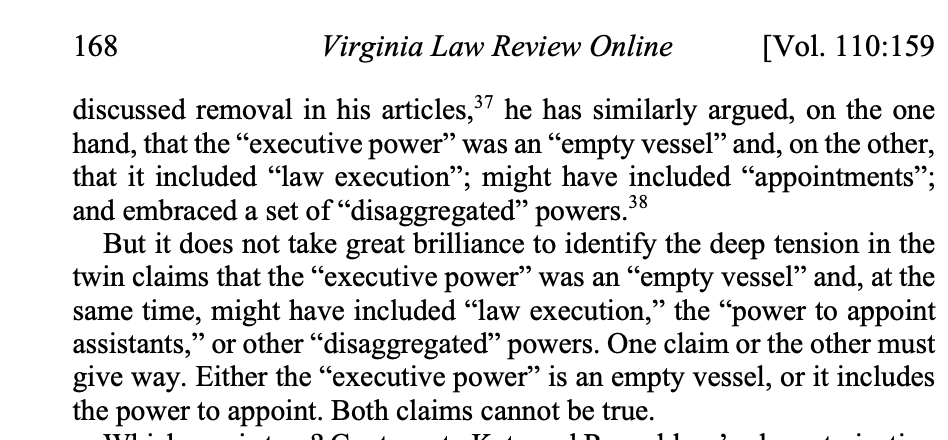
“But it does not take great brilliance…” is rhetoric best reserved for Above the Law or appealing an Aileen Cannon opinion, not a law review article. Having been involved as a senior staff member at a journal, this is the sort of sentence that we’d have asked the authors to remove as baselessly antagonistic. Though even without the useless shade, Mortenson says the substance is also lacking:
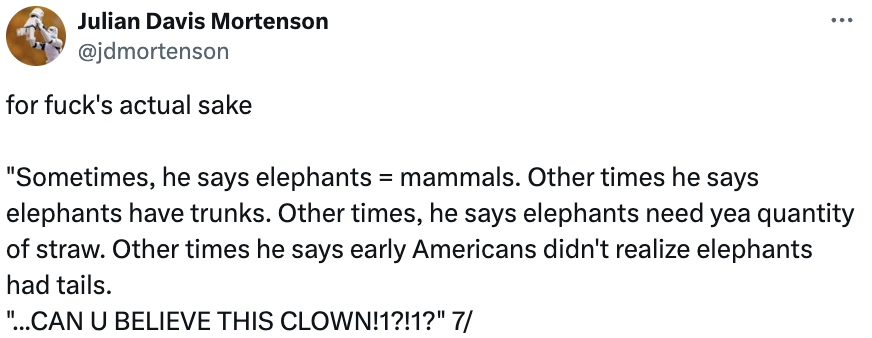
An “empty vessel” doesn’t mean it’s toothless, it means it’s a floating concept that folks can impute with whatever they want. Like an American flag representing equality and opportunity to some and redneck nationalism to others. And while it does not take great brilliance to figure that out, the UVA boys seem to be struggling with it.
But then Boston University Professor Jed Shugerman took to social media to echo Mortenson’s concerns.
🧵 from @jdmortenson on Sai Prakash & Aditya Bamzai is devastating.
It has serious legal implications – and it is actually much worse.
Julian & I have asked questions for years privately & politely.I regret that it has come to this.
I regret I didn’t call them out 4 yrs ago. 1/ https://t.co/aeYOemrSEv— Jed Shugerman (@jedshug) August 25, 2024
Shugerman noted that he’d reached out over potentially misused sources back in 2020 only to have those concerns ignored and the misuses repeated. But then he detailed a bizarre sandbagging episode at a conference Bamzai was invited to attend:
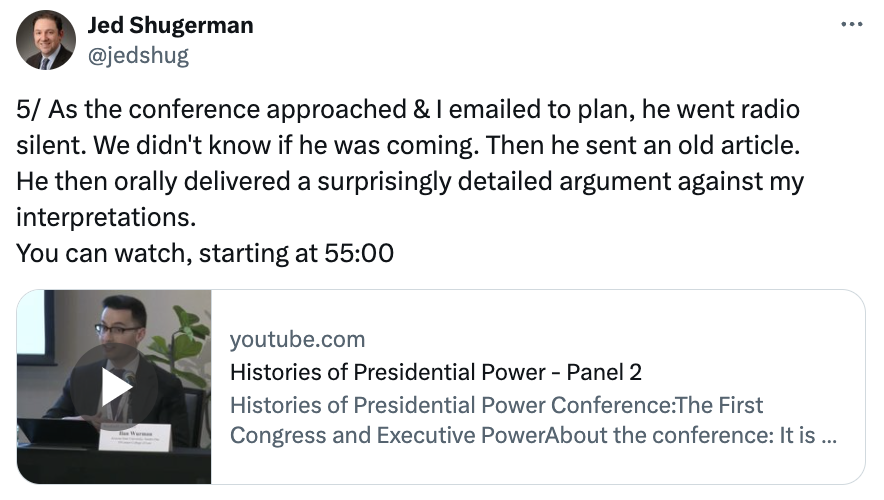
This is a tad inside baseball, but according to the thread, what happened here is that Prakash and Bamzai already had an article accepted in the Harvard Law Review on this topic, but didn’t share that — or even acknowledge its existence — before showing up for this event. Essentially, they dumped their opposing research on Shugerman without giving him the standard courtesy of a chance to review their work first.
Made even worse when the core of the counterargument was, quoting the thread, “an obscure 1803 case” that they wouldn’t let their supposed adversaries know about ahead of time.
But, as Shugerman explains, the stakes are higher than an academic squabble:
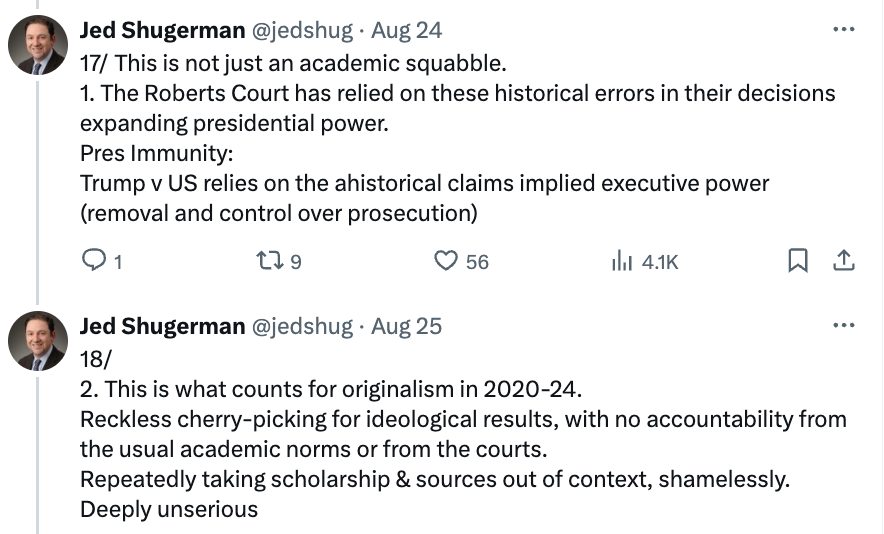
Oh… I’ve got some bad news:
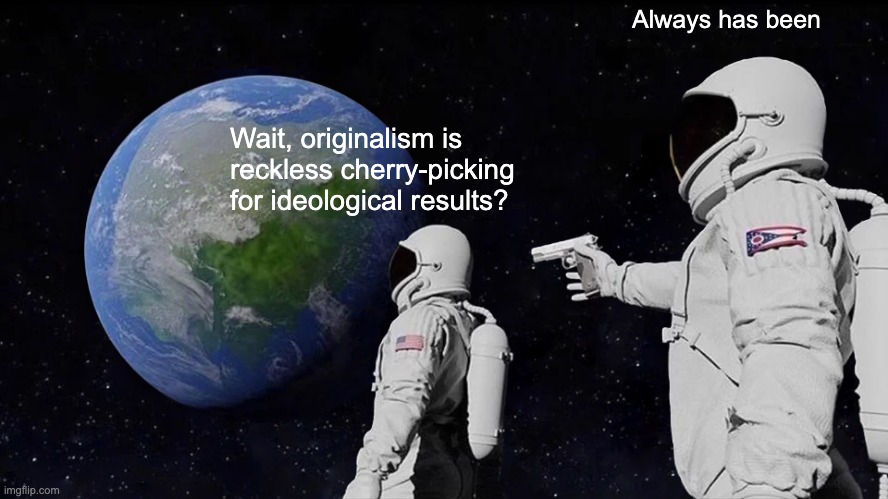
And it goes way beyond executive power. Mismatch theory — the clumsy legal scholarship-driven effort to “prove” that Black students aren’t smart enough for top-tier colleges — is a methodological mess that’s widely discredited in the real world, but still finds its way into the Supreme Court’s thinking.
But perhaps nowhere is the damage that bad scholarship can cause more pronounced than on the Second Amendment.
This is also, incidentally, the story of 2nd Am scholarship prior to Heller. Political scientists & historians like @spitzerb & @JRakove were like uh these claims that are being repeatedly recirculated in law reviews are not based on current or best evidence, all to no avail. https://t.co/Q95wbq8SXL
— Jake Charles (@JacobDCharles) August 25, 2024
Another reminder that America’s Second Amendment jurisprudence is now governed by vibes masquerading as history. A right-wing jurist of the last generation called the Second Amendment theory that would eventually be enshrined — for the first time — in Heller as a “fraud on the American public,” but years of law review articles compiling flimsy historical Mad Libs in favor of unfettered gun rights provided the Court the foundation it needed to rewrite constitutional law under the fig leaf of originalism.
It’s garbage in, garbage out and poor scholarship can lead to a lot of garbage.
Unwittingly, @JacobDCharles explains why student-edited law reviews are important. The 2nd Amend arguments made by most academic historians are fallacious. Yet, these historians face little critical commentary in their field. Ideological hiring and peer review stifle debate. https://t.co/b3mRkFjYRS
— Robert Leider (@LeiderRob) August 25, 2024
ASS Law has joined the chat!
Personally, I thought the argument for student-led journals is providing a rigorous practical education in copyediting and critically evaluating scholarship. But “ignorance makes for better scholarship” is certainly… another take! And one that actual historians refused to just sit there and take. At this point the debate cross-pollinated over from legal academia to the actual historians with Professor Rachel Shelden of Penn State joining the fray:
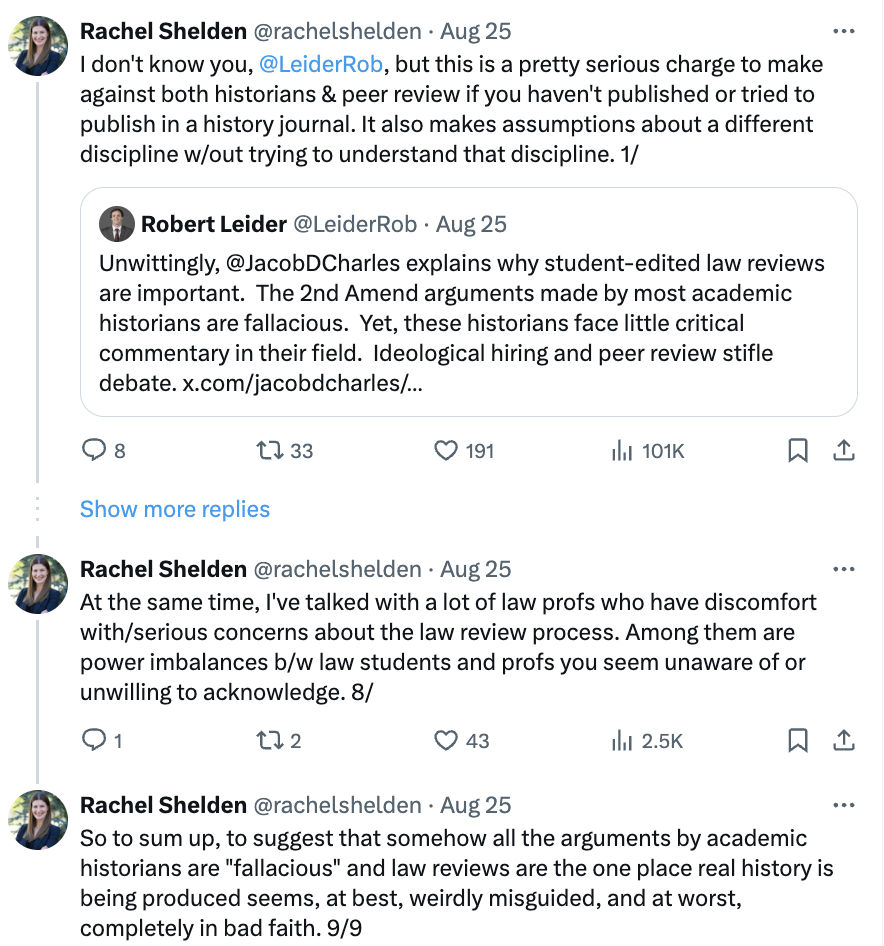
Historian Jack Rakove responded even more bluntly:
A truly astute comment coming from someone whose speculative attempts to write historically verge between the comic and the absurd, who could never survive peer review of his work, and who teaches at what is probably the most ideological law faculty in the country. Gimme a break! https://t.co/VaaoNl4dI6
— Jack Rakove (@JRakove) August 25, 2024
Oof.

Though when he says “new” he means “speculative” and “reverse engineered from policy preferences.”

In any event, it was a wild weekend across academia all kicked off by law professors airing their concerns about mischaracterizing another’s work.
Getting back to class couldn’t come soon enough.
 Joe Patrice is a senior editor at Above the Law and co-host of Thinking Like A Lawyer. Feel free to email any tips, questions, or comments. Follow him on Twitter or Bluesky if you’re interested in law, politics, and a healthy dose of college sports news. Joe also serves as a Managing Director at RPN Executive Search.
Joe Patrice is a senior editor at Above the Law and co-host of Thinking Like A Lawyer. Feel free to email any tips, questions, or comments. Follow him on Twitter or Bluesky if you’re interested in law, politics, and a healthy dose of college sports news. Joe also serves as a Managing Director at RPN Executive Search.

